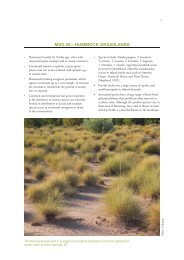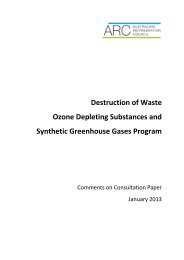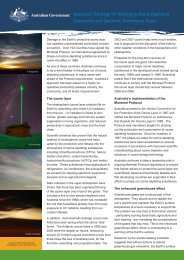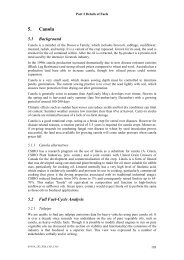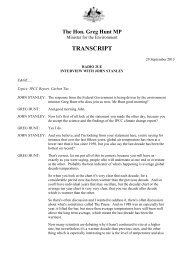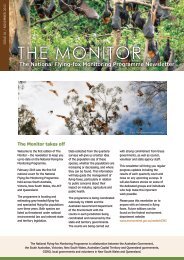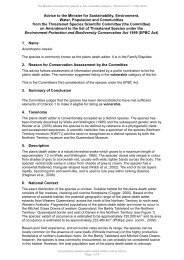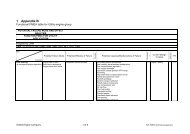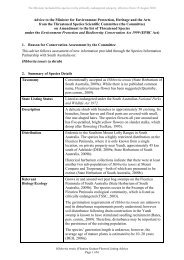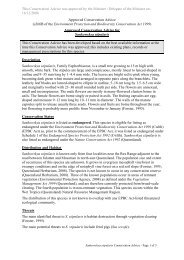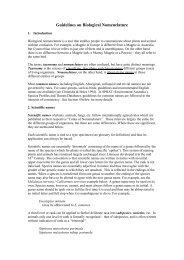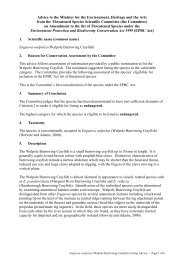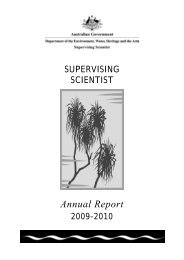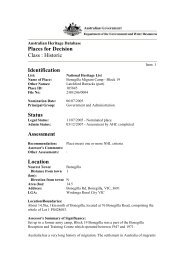WEST KIMBERLEY PLACE REPORT - Department of Sustainability ...
WEST KIMBERLEY PLACE REPORT - Department of Sustainability ...
WEST KIMBERLEY PLACE REPORT - Department of Sustainability ...
Create successful ePaper yourself
Turn your PDF publications into a flip-book with our unique Google optimized e-Paper software.
struggle noted, the local maparn, a clever, ritually powerful individual had the power<br />
to relocate the fat, that is, the oil <strong>of</strong> the Dreamtime Goanna (Allbrook 2009, 11 citing<br />
Dixon 1990).<br />
Although the State government had succeeded in the short-term in exerting its<br />
authority, the actions taken at Noonkanbah were a catalyst for change in law, policy<br />
and practice in how governments, resource companies and Aboriginal people would<br />
do business in the future. The inability <strong>of</strong> statutory law to provide even a rudimentary<br />
level <strong>of</strong> protection to Aboriginal sites <strong>of</strong> significance was starkly demonstrated by the<br />
events <strong>of</strong> Noonkanbah. The failure <strong>of</strong> the Gove land rights case <strong>of</strong> 1970 (Milirrpum<br />
and others vs. Nabalco Pty. Ltd and the Commonwealth <strong>of</strong> Australia) meant that<br />
Australian common law did not recognize Aboriginal customary land ownership.<br />
Partly as a consequence <strong>of</strong> Noonkanbah, some Australian governments progressively<br />
implemented statutory land rights and heritage protection measures aimed at<br />
providing limited avenues for Aboriginal assertions <strong>of</strong> traditional land ownership and<br />
responsibilities to care for important sites. Noonkanbah exposed the fragility <strong>of</strong><br />
statutory law in providing even basic protection to Aboriginal sites <strong>of</strong> importance, and<br />
illustrated the disjuncture between Aboriginal assertions <strong>of</strong> land ownership under<br />
traditional law and custom and a government which was intent on showing that such a<br />
view was not supported by the law. In response to Noonkanbah, the Western<br />
Australian Government further narrowed the definition <strong>of</strong> Aboriginal heritage and<br />
changed the previously independent Heritage Council to an advisory body, making<br />
the Heritage Minister responsible for decisions. These amendments effectively cut<br />
Aboriginal people out <strong>of</strong> any legal recourse to protect their heritage from resource<br />
extraction activities.<br />
* * * *<br />
'If events like Noonkanbah are seen as giving rise to the Mabo legislation, the irony is<br />
that, with the common law recognition <strong>of</strong> native title in Australia, there occurred the<br />
greatest realignment in power over resources between Aboriginal people and industry<br />
since the commencement <strong>of</strong> colonisation' (Ritter 2002, 8).<br />
* * * *<br />
Similarly, Allbrook (2009) states that the Noonkanbah episode brought an increased<br />
radicalisation in Aboriginal politics, and an increased clarity in Aboriginal people<br />
enunciating their concerns. Similarly, Vachon and Toyne (1983) noted that:<br />
* * * *<br />
'[T]he Government has inadvertently propelled them [the Noonkanbah protesters],<br />
along with other Aborigines, into a political arena where land rights, and not only the<br />
protection <strong>of</strong> sites, may just be possible … contrary to everything the Government<br />
may have intended, a pan-Aboriginal unity has begun to emerge…'(Vachon and<br />
Toyne 1983, 131).<br />
* * * *<br />
Noonkanbah represented 'worst practice' in relations between resource companies and<br />
Aboriginal traditional owners, and played an important role in the subsequent<br />
adoption <strong>of</strong> inclusive and co-operative exploration and resource extraction practices<br />
which acknowledged Aboriginal rights and interests in land outside <strong>of</strong> the common<br />
131



